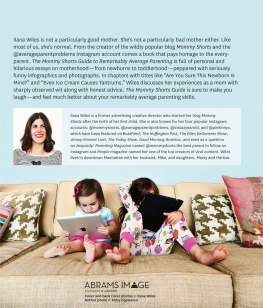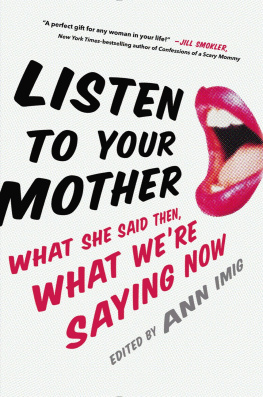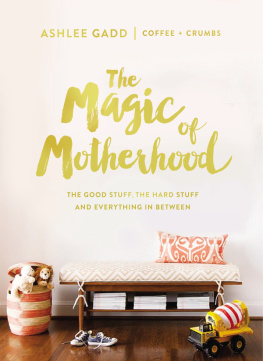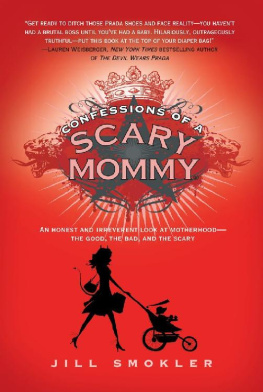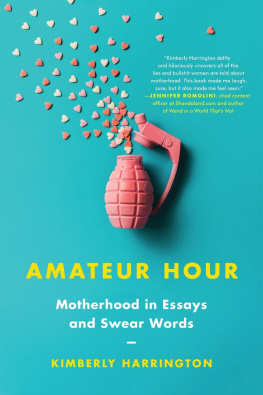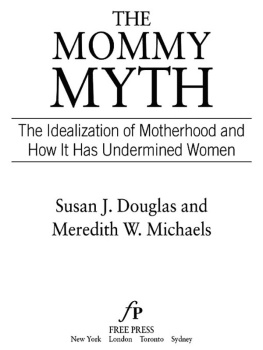

The Good Mother Myth
Seal Press
Copyright 2014 Avital Norman Nathman
Published by Seal Press
A Member of the Perseus Books Group
1700 Fourth Street
Berkeley, CA 94710
www.sealpress.com
All rights reserved. No part of this book may be reproduced or transmitted in any form without written permission from the publisher, except by reviewers who may quote brief excerpts in connection with a review.
Sarah Emily Tuttle-Singers essay No More Fakebook is a reprint from Kveller.com. Reprinted courtesy of Kveller.com, where it originally appeared on February 25, 2013.
Jennifer Baumgardners essay All the Single Ladies originally appeared in Fem! 2011 by Jennifer Baumgardner, published by Seal Press.
Library of Congress Cataloging-in-Publication Data
Good mother myth : redefining motherhood to fit reality / edited by Avital Norman Nathman.
pages cm
Includes bibliographical references and index.
ISBN 978-1-58005-503-1
1. Motherhood. 2. Parenthood. I. Nathman, Avital Norman.
HQ759.G5876 2013
306.8743--dc23
2013034424
Cover design by Faceout Studio, Tim Green
Interior design by Amber Pirker
Distributed by Publishers Group West
FOR MARC AND ELIJAH
Without whom I wouldnt have ever been a mother...
let alone had a chance at being a good one
CONTENTS
CHRISTY TURLINGTON BURNS
a S AN ADVOCATE for global maternal health, I think about moms and our quality of life a lot. I founded Every Mother Counts with a goal to make pregnancy and childbirth safer for all moms following the childbirth-related complication I experienced after delivering my daughter in 2003. Once I learned that hundreds of thousands of girls and women die every year from preventable, birth-related complications, I decided to take action.
What I have learned over the years since becoming a mom is that whether you live in a society where motherhood is celebrated, or in one where it is simply assumed, most of us could better fulfill our roles as mothers if we had more support from one another. While Every Mother Countss mission is to reduce preventable deaths at birth, I have become increasingly concerned with the full spectrum of issues that are harmful to the lives of mothers, especially those that reduce or demean our roles in societynot just as mothers, but as women.
In my own life, Ive come to appreciate the challenge of integrating my roles as a woman, a professional, and as a mother, because in making the attempt as women to be fully human, we let our children grow up seeing our motherhood not as one of total self-sacrifice, but one where we take care of ourselves, and in doing so, take better care of others.
While in the Western World, we have some of the greatest rights and privileges as women and mothers than anywhere else in the world, we yet have an insidious burden working against our empowerment and freedom. It is the deeply entrenched ideal of the Good Mother. Its a myth that is largely predicated on patriarchal constructs, one that creates false standards that sets women up for failure, not success, and for judgment instead of support. It is an attempt to disempower the experience of motherhood. It tells us we are not worthy of our power to create, and that we must conform to narrow ideals of what makes a mother good. It robs us of our capacity to mother to the best of our own abilityindividually, with varying sensibilities and contextsand makes us doubt not just ourselves but other womenwhether they have children or not! Sadly, the Good Mother Myth functions as a check and balance against our ability to create a rich and varied community of women who are valued for their freedom to mother in a way that works for them, not in a way that conforms to narrow ideals of perfection. Its no wonder so many women struggle with their sense of value and self-worth, especially evolving mothers here and abroad who are just now discovering greater freedoms than being simply a conduit for bringing children into the world.
At this point in time, the possibility and importance of connecting, empowering, supporting, and accepting each other as women and mothers at every point along the mothering spectrum is crucial. To evolve as humans we must let go of behaviors and attitudes that hold the whole of humanity back. As mothers, we must do the same. The Good Mother Myth is harmful in its earnestness to define what motherhood means at the expense of women as individuals and as a community. It divides us, and what divides us makes us less powerful.
Thats why the essays inside this book are so important. They are the collective consciousness of ever-evolving women who share the experience known as motherhood. At times poignant, challenging, funny, and subversive, the essays together represent the spectrum of women who have abandoned or flouted the narrow confines of the Good Mother Myth, often revealing individual perspectives that are also universal.
Together, our stories weave a fabric of motherhood that is textured and intricate and sometimes even flawed, but in its entirety, is also beautiful and more powerful than most of us realize.
h ER KIDS HAVE ALWAYS slept through the night, and even if they dont, she still manages to look like she has had eight hours of uninterrupted sleep. There is always a well-balanced, home-cooked meal on her dinner table. She holds down a fulfilling job while still finding time to join the PTA, run the schools book fair, and attend every soccer game. Her house is absolutely spotless, and if its not, she can effortlessly laugh it off. She has the energy and desire for a happy and adventurous sex life, and her partner is always satisfied. She is crafty, creative, and embodies the perfect blend of modern woman and hipster housewife. She is usually white, middle to upper class, heterosexual, married, and neither too young nor too old.
But above all... shes a myth.
The myth of the good mother is one continuously embedded in our lives, passed down from generation to generation, shape-shifting to fit the nuances of culture and society but always imbued with a fabled ideal of what constitutes the perfect mother. Today she starts even earlier, manifesting herself as the good pregnant woman and the good birther, piling on multiple layers to this already formidable archetype.
This Good Mother has been cemented into our society through television, movies, and most recently, via the Internet, where social networking sites like Facebook, Pinterest, Twitter, and the explosion of mommy blogs feed us images and ideas of perfection at a rate faster than ever before. And we are not just eating it up, we are measuring our own motherhood against it all. But a good chunk of these impressions are just that: dressed up or watered down versions of reality. In other words, all of these perfectly executed nurseries, beautifully decorated birthday cakes, Martha Stewart-quality holiday meals and hyper-organized playdates are feeding into the ever-growing myth.
Motherhood as a topic du jour has also remained a staple of the news media, providing endless fodder for websites, magazines, daytime talk shows, and political debate. The majority of these stories hardly begin to scratch the surface of what motherhood really looks like. Instead, cute and quippy sound bytes end up sanitizing the concept of motherhood, or they go to the other end of the spectrum, fostering a manufactured culture of conflict and judgment.
As the myth grows, so too do the negative consequences of its saturation in our lives. The so-called Mommy Wars, mothers guilt, peer judgment, mental illness, and postpartum depression have all been caused or exacerbated by the unrealistic expectations promoted by the Good Mother Myth.
Next page

